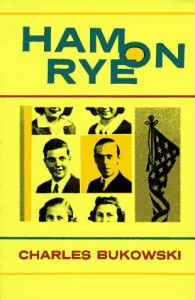 Charles Bukowski’s Ham on Rye is a book my mom wouldn’t like. That’s not to say it wasn’t good. It’s the best book I’ve read in years (almost by default), but my mom would hate it. The problem is there’s no plot. That seems to be her argument whenever she finds something she doesn’t like – as if it were somehow an intrinsically damning thing to not be structurally similar to everything else. What Ham on Rye does have though is a character that’s realistic, sincere, depressing, funny, and easy to feel empathetic towards. That ultimately leads to a story that’s well worth reading, even without the backbone of a plot to graft itself around.
Charles Bukowski’s Ham on Rye is a book my mom wouldn’t like. That’s not to say it wasn’t good. It’s the best book I’ve read in years (almost by default), but my mom would hate it. The problem is there’s no plot. That seems to be her argument whenever she finds something she doesn’t like – as if it were somehow an intrinsically damning thing to not be structurally similar to everything else. What Ham on Rye does have though is a character that’s realistic, sincere, depressing, funny, and easy to feel empathetic towards. That ultimately leads to a story that’s well worth reading, even without the backbone of a plot to graft itself around.
The narrative of Ham on Rye follows the life of Henry Chinaski from birth until the day the Japanese bombed Pearl Harbor. That doesn’t mean this story is about that event, only that it literally ends on that day. There are clear parallels between the character of Chinaski and that of Bukowski’s real life, but there are also moments that are obviously imbellished. Some chapters outline the events that caused Chinaski to become the person he eventually becomes, and some seem like drawn out dirty jokes. My favorite chapters are the ones that combine the two.
Reading this on the Kindle you’re able to see the passages that other readers have highlighted. I’m not sure if I like this or not. I know I have the ability to turn it off, but there’s a morbid curiosity I have that prevents me from doing so. It sometimes feels like I bought the book used, as I always find myself looking at the passages the person before me underlined and criticizing their reasoning. Sometimes they’ll underline something that’s totally out of context, and I’ll go in and re-underline the part with the context in tact in an effort to toss my own hat into the ring so that the next person who picks up the book might happen upon my used copy. In the case of Ham on Rye, people decided to primarily highlight passages that say something about life. I highlighted the punchlines to the dirty jokes.
My biggest disappointment with the book, honestly, is how it always feels like it’s leading somewhere, but never quite gets around to going places, then Pearl Harbor gets bombed and it just ends. Henry spends the first half of the book curious about women, but the book never gets around to exploring his first sexual encounter. Henry spends an equal amount of time, his teenage years, with his body covered in boils, but there’s never a big, “my boils were finally gone” moment. Maybe this is my mom’s demand for plot seeping into my subconsciousness, but it was disappointing for these themes and events to never find closure. But then, that’s what real life is like. You don’t have that moment when the things that scar you suddenly go away, it happens so gradually that by the time they go away you’re so used to dealing with them that you barely notice. So, despite my disappointment, I’m not sure I would change anything. That’s just the kind of book this is.
-Wes

This book looks interesting. I would be interested in seeing what other people highlighted. Great blog!